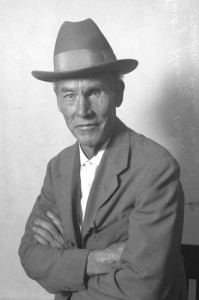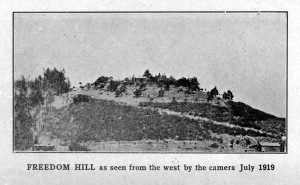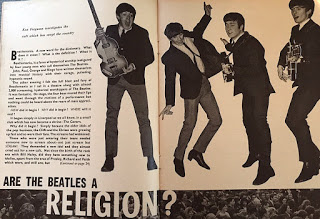Found – a small and very rare book Happy in Hell (Freedom Hill Pressery, Burbank, 1924) by ‘Freedom Hill Henry’ (Dr. Henry Leroy.) He founded a commune in the Shadow Hills district above Burbank which flourished between 1913 and 1930. It was known as Freedom Hill. This small book was limited to 957 copies and printed and bound by the author. He wrote another book called Miserable in Heaven and also a study of Jacob Beilhart of the Spirit Fruit Society, an influence on him. A bit of a joker he has a note at the front: “Dear Comrade: If you like this booklet, lend it to your poor friends and tell your rich friends to buy a copy. If you don’t like it, keep quiet, and consult a specialist on mental diseases. I am an insane specialist and I can readily tell whether any one is just right in his mind. If you agree with my notions, then you are all right. If you don’t agree with me, then I know you are crazier than I am.”
Leroy’s philosophy, if that is not too lofty a word for his ideas, is hinted at in the titles of his books Miserable in Heaven and Happy Hell. He was influenced by Edward Carpenter, Walt Whitman, the Theosophists, Vivekenanda, Martin Luther and even Luther Burbank. It was essentially a loving philosophy aimed at helping people to think for themselves and realize that they could change the way they had always looked at things and to be ‘happy in hell’ (or purgatory.) He writes:
 We are in slavery as long as we can’t get what we want, all that we want, and nothing but what we do want. Do you think we shall ever become skillful enough to get all that we want and nothing but what we do want? Or, in other words, do you think we shall ever become free? If we can’t become skillful enough to get what we want, maybe WE CAN BECOME SIMPLE ENOUGH TO WANT WHAT WE GET, and that would amount to the same thing. In order to do and to get what we please we may have to change our pleases. If we could change our pleases to what we do do, and to what we do get, then our doing and our getting would correspond with our pleases. Then we could say we do as we please and get what we please. It is wonderful how logic can make impossible things easy. The way to do as we please is to be pleased with what we do. The way to get what we want is to want what we get. The way to be free is to be content with our lot. Now I have given you a secret of happiness— a secret worth a million dollars to you if you will take it and use it.
We are in slavery as long as we can’t get what we want, all that we want, and nothing but what we do want. Do you think we shall ever become skillful enough to get all that we want and nothing but what we do want? Or, in other words, do you think we shall ever become free? If we can’t become skillful enough to get what we want, maybe WE CAN BECOME SIMPLE ENOUGH TO WANT WHAT WE GET, and that would amount to the same thing. In order to do and to get what we please we may have to change our pleases. If we could change our pleases to what we do do, and to what we do get, then our doing and our getting would correspond with our pleases. Then we could say we do as we please and get what we please. It is wonderful how logic can make impossible things easy. The way to do as we please is to be pleased with what we do. The way to get what we want is to want what we get. The way to be free is to be content with our lot. Now I have given you a secret of happiness— a secret worth a million dollars to you if you will take it and use it.


